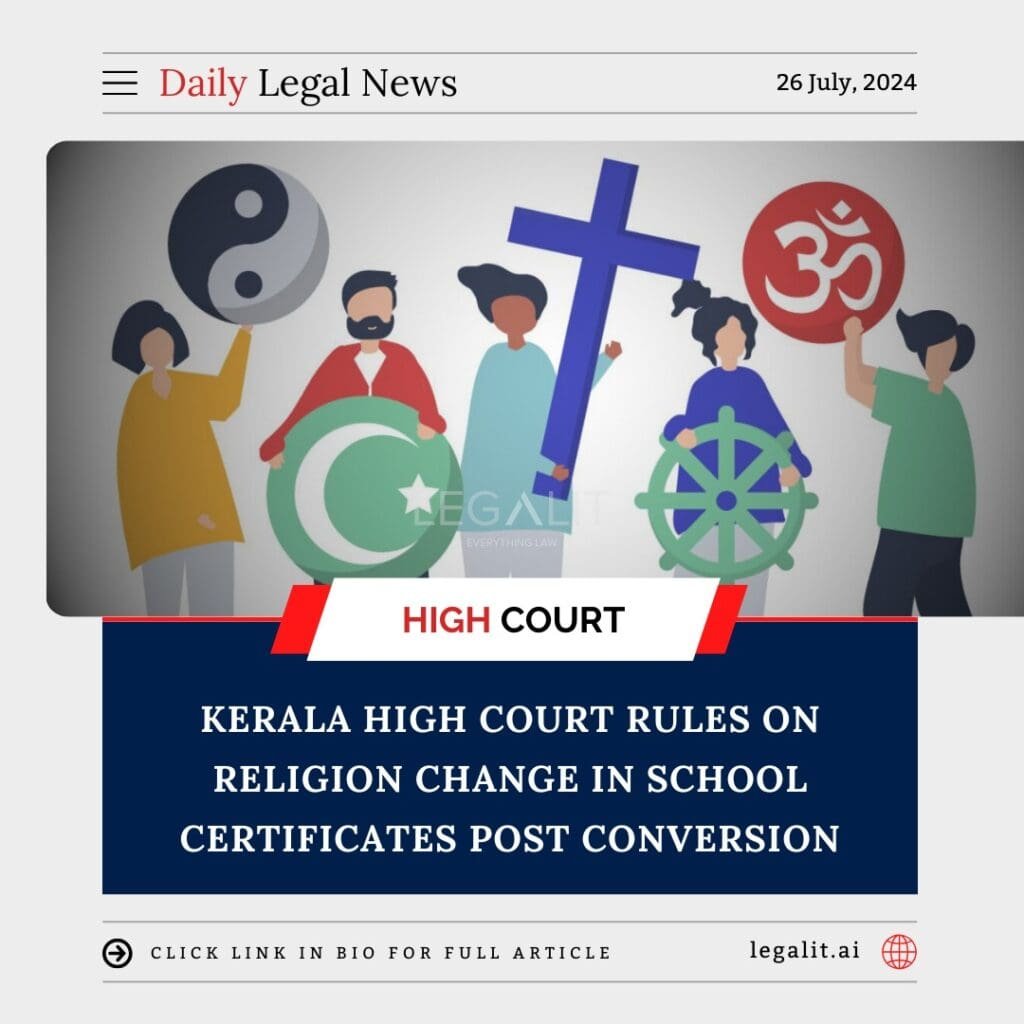
In a landmark judgment, the Kerala High Court has ruled that individuals who convert to a different religion should be allowed to change their religion in school certificates. This decision underscores the right to religious freedom and the recognition of individuals’ personal choices in official documents.
Background of the Case
The case arose when several individuals who had converted to different religions petitioned the court, seeking the ability to amend their school certificates to reflect their new religious affiliations. They argued that the current regulations, which did not permit such changes, were discriminatory and infringed on their fundamental rights to religious freedom and personal identity.
The petitioners highlighted that their school certificates, which still reflected their original religion, were causing practical difficulties and emotional distress. These certificates are often required for various legal, educational, and professional purposes, and having inaccurate information could lead to complications.
Court’s Rationale
The Kerala High Court, in its judgment, emphasized several key points:
- Fundamental Right to Religious Freedom: The court reaffirmed that the right to freely profess, practice, and propagate one’s religion is a fundamental right enshrined in the Constitution of India. This right includes the ability to have one’s religious identity accurately reflected in official documents.
- Personal Identity and Dignity: The court recognized that an individual’s religion is a core aspect of their personal identity and dignity. Ensuring that official documents accurately reflect this identity is essential for maintaining the individual’s self-respect and societal recognition.
- No Justifiable Reason for Denial: The court found no valid reason to deny individuals the right to update their school certificates following a change of religion. It noted that allowing such changes does not harm any public interest and merely aligns official records with the individual’s current status.
- Administrative Procedures: The court directed the relevant educational authorities to establish clear and straightforward procedures for individuals seeking to update their religious affiliation in school certificates. These procedures should be designed to minimize bureaucratic hurdles and ensure timely updates.
Implications of the Ruling
The Kerala High Court’s ruling has significant implications for individuals who convert to different religions and for the broader legal and administrative systems:
- Recognition of Religious Conversion: The decision underscores the legal recognition of religious conversion and the need for official documents to reflect such changes accurately. This is a positive step towards respecting individual rights and freedoms.
- Administrative Reforms: Educational authorities will need to develop and implement procedures to facilitate the updating of school certificates. This may involve issuing guidelines, training staff, and establishing a streamlined process for handling such requests.
- Precedent for Other States: The ruling sets a precedent that could influence similar cases and policies in other states. It highlights the importance of aligning official records with individuals’ current identities and respecting their personal choices.
- Empowerment of Converts: For individuals who have converted to a different religion, this ruling provides empowerment and validation. It ensures that their new religious identity is acknowledged and respected in official records, reducing potential stigma and discrimination.
Moving Forward
Educational institutions and authorities in Kerala will need to comply with the court’s directives and establish mechanisms to facilitate the updating of school certificates. This includes creating application processes, verification methods, and timelines for processing requests.
Furthermore, the ruling encourages a broader dialogue on the importance of respecting individual rights and freedoms in official documentation. It calls for a more inclusive and responsive administrative system that adapts to the diverse needs of society.
Conclusion
The Kerala High Court’s decision to allow changes in school certificates following religious conversion is a significant affirmation of the right to religious freedom and personal identity. By ensuring that official records accurately reflect individuals’ current religious affiliations, the ruling promotes dignity, respect, and inclusivity. As the state implements this decision, it sets a valuable precedent for other regions, emphasizing the importance of aligning legal and administrative practices with fundamental human rights.